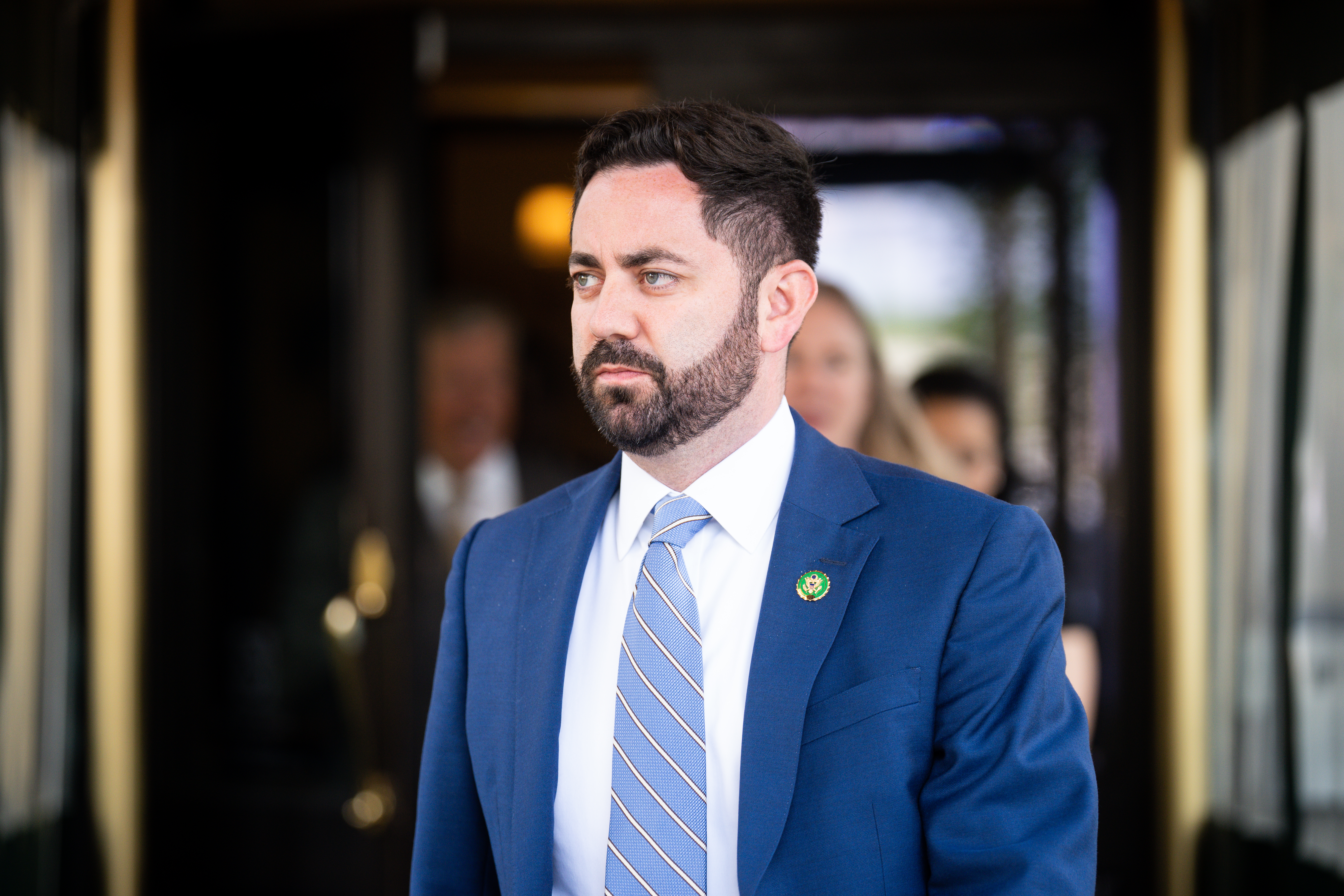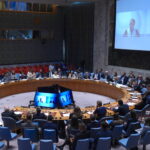The bill presents an alternative to a bipartisan effort to fully repeal sanctions on the new Syrian government

Rami Alsayed/NurPhoto via Getty Images
Syrian President Ahmad Al-Sharaa attends the signing ceremony of a strategic agreement to develop Tartus Port in Damascus, Syria, on July 13, 2025.
The House Financial Services Committee voted on Tuesday to advance a bill that would place a series of conditions on the lifting of U.S. human rights sanctions on Syria, after a debate over whether the U.S. should instead pursue complete sanctions relief for the new Syrian government.
The bill, led by Rep. Mike Lawler (R-NY), would require the Syrian government to comply with various human rights-related conditions, including protecting religious minorities, as a precondition for waiving under the Caesar Civilian Protection Act.
The bill presents an alternative to a parallel bipartisan effort in both chambers to fully repeal sanctions on the new Syrian government — underscoring continued tensions on the issue on Capitol Hill following the Trump administration’s efforts to release sanctions on the new Syrian government.
The bill advanced through the committee by a 31-23 vote, with Republican Rep. Byron Donalds (R-FL) voting with most Democrats against it, and Democratic Reps. Josh Gottheimer (D-NJ) and Brad Sherman (D-CA) voting for the legislation.
“The objective here is to begin the process of lifting the sanctions,” Lawler said. “We have to recognize the fragility of the situation on the ground. We want Syria to be more stable. We want a more stable government. We want the Syrian people to be free from the oppression of the Assad regime. But in order to get there, we can’t just willy-nilly trust that everything is going to be A-OK. And so what we’re trying to do here is give the administration flexibility to begin the process of lifting sanctions. I think a wholesale repeal of the sanctions is premature.”
He said that it would be “foolish” to fully eliminate sanctions while there are still conflicts between the Syrian government and Israel, and amid ongoing attacks against Druze, Alawite and Christian minorities by Syrian government-aligned forces.
“What we are trying to accomplish here is to ensure that a sanctions regime is not completely eliminated, that there are conditions and benchmarks on the ground that have to be met, so that we do hold this new Syrian government accountable,” Lawler said, and “that they are in fact, making decisions and taking actions that create a much better and more stable situation in Syria.”
Lawler said the legislation “recognizes the fragility here and tak[es] a positive step forward so that this fledgling government actually potentially has a chance to succeed, but if you immediately lift the sanctions and there’s no accountability whatsoever, my fear is that [the tenuous stability in Syria] will collapse.”
Lawler added that it’s important for the sanctions infrastructure to remain in place in case the Syrian government falls.
Rep. Maxine Waters (D-CA), the committee’s ranking member, and other Democrats argued that the legislation did not go far enough in repealing the sanctions, and would set up the new Syrian government for failure. She introduced an amendment, which failed, to fully repeal the Caesar Act.
“Only full repeal will assist the Syrian interim government and [the] Syrian people,” Waters said. “We must help the Syrian people to rebuild Syria and to encourage investments in its future. As written, this bill blocks that goal.”
She said that “giving a little bit of money to the Syrian government is a throwaway. It does not accomplish what you think it will accomplish.”
“There will be great expectations of the government [that] they cannot fulfill with your little bitty partial removal of sanctions,” Waters continued.
Rep. Rashida Tlaib (D-MI) argued that the sanctions are hurting the Syrian people, and highlighted calls from Syrian-American organizations for full repeal of the sanctions.
Sherman argued that the U.S.’ voice is important particularly in speaking up for Syrian minorities, such as the Christians, Druze and Alawites who are under attack.
He worked during the committee meeting with Lawler and committee leadership on an amendment, which passed, that would modify the language in the legislation around the protection of religious minorities.
The new language states that the Syrian government must “take reasonable steps” to protect religious minorities, on top of the original legislative language requiring that the government not target or detain religious minorities.
Rep. Joe Wilson (R-SC), the lead Republican sponsor of the concurrent effort to fully repeal the Caesar Act, said on X that the bill “in its current form is not the right approach forward and does not align with President [Donald] Trump’s agenda for Syria. “
“I believe that a clean repeal of the Caesar Act is most in line with the President’s agenda to ‘give Syria a chance,’” Wilson said. “Keeping Caesar on the books for years will only deter long term reconstruction which could help ISIS resurgence.”
The legislation stops short of full repeal of the 2019 Caesar Syria Civilian Protection Act sanctions bill that other lawmakers are pushing on a bipartisan basis

Bill Clark/CQ-Roll Call, Inc via Getty Images
Rep. Mike Lawler (R-NY) leaves the House Republicans' caucus meeting at the Capitol Hill Club in Washington on Tuesday, May 23, 2023.
The House Financial Services Committee is set to consider legislation by Rep. Mike Lawler (R-NY) this week that aims to create oversight and set conditions for lifting sanctions on Syria, but stops short of full repeal of the 2019 Caesar Syria Civilian Protection Act sanctions bill that other lawmakers are pushing on a bipartisan basis.
That the House is moving forward with Lawler’s legislation, which sets conditions for waiving Caesar Act sanctions, rather than the bipartisan Caesar Act repeal effort may indicate a level of continued skepticism from some House members about the prospect of full sanctions relief for the new Syrian government that has been pushed by the Trump administration.
“This bill modernizes the existing sanctions regime on Syria, requires assessments on existing sanctions relief provisions, and sets out goals for the Syrian government to meet anti-money laundering and anti-corruption standards,” Lawler said in a statement. “As the Trump Administration is already reviewing sanctions policy, we must ensure they have the tools to do so that reflect the current security environment.”
“The al-Sharaa Administration certainly has a lot of work to do to reintegrate Syria with the U.S. and our allies. While this job should be difficult given the circumstances, it shouldn’t be impossible,” Lawler continued.
The Lawler bill would amend the Caesar Act to allow the president to waive the sanctions as long as the Syrian government meets a number of conditions, including that it not bomb its civilian population; allow humanitarian aid, medical access and freedom of travel; releases political prisoners detained by the Assad regime and allows international human rights groups to inspect prison facilities; does not target medical facilities, schools, residential areas, markets and community gatherings; combats production and proliferation of the illicit drug Captagon; and does not target or detain religious minorities.
The legislation also extends the waiver period for the sanctions from 180 days to two years. I would sunset the Caesar Act entirely when the administration verifies that Syria has been in compliance with those conditions for two years or at the end of 2029, whichever comes sooner.
Another section of the legislation instructs the administration to brief Congress on regulatory and enforcement relief provided to the Central Bank of Syria through the Financial Crimes Enforcement Network, allowing the bank to re-integrate with the global financial system.
It also asks the administration to assess whether the Export-Import Bank should be allowed to support exports to Syria; it is currently banned from doing so.
In addition, it instructs the administration to work to support policies to combat money laundering, weapons proliferation and corruption, as well as support financial connectivity and economic growth in Syria at the International Monetary Fund and World Bank.






























































